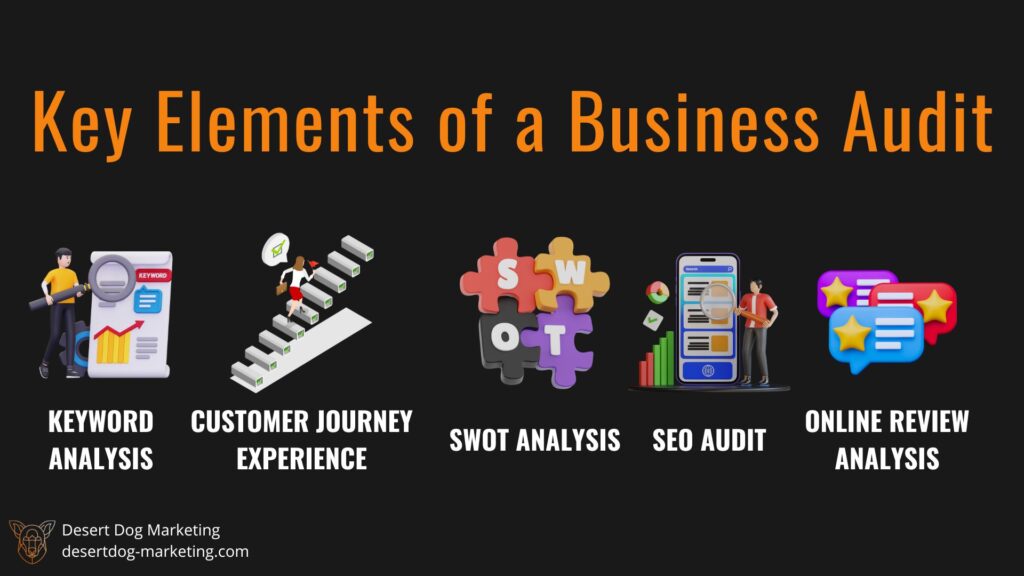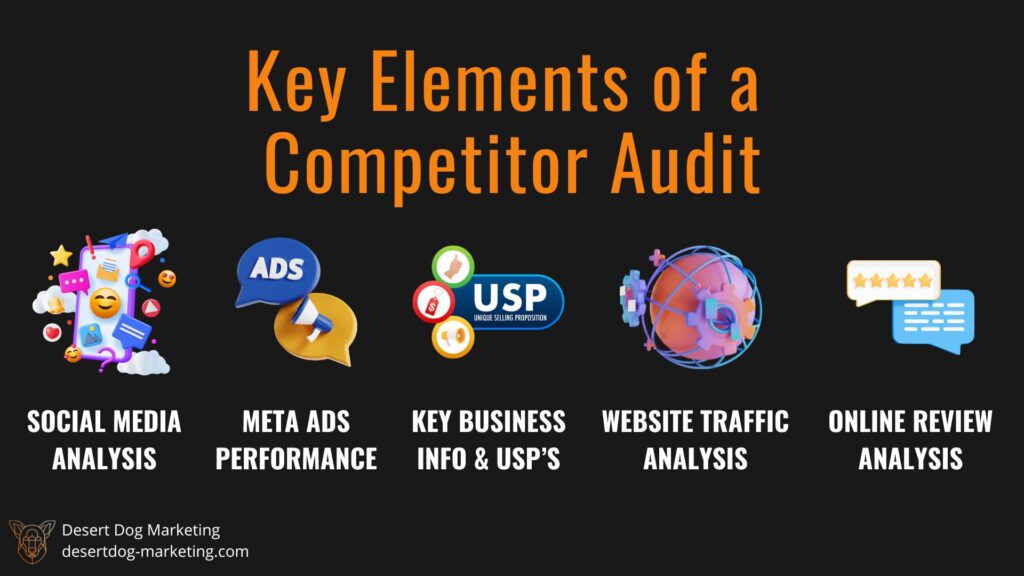Staying ahead means understanding both your internal operations and what your competitors are up to. That’s where a Business and Competitor Audit comes into play. Think of it as a health check for your business that evaluates your strengths and weaknesses and compares them to your competitors. With an audit like this, you gain valuable insights that allow you to fine-tune your strategy, capitalize on market opportunities, and navigate potential risks.
What is a Business Audit?
A business audit is a thorough examination of your company’s internal systems, processes, and performance. It helps identify inefficiencies, assess financial health, and evaluate operational effectiveness. In other words, it’s a way to understand how well your business is functioning and what improvements can be made.
Importance of a Business Audit
Conducting a business audit ensures that you’re on track with your business goals and helps you uncover areas where you’re lagging. This can cover everything from financial metrics, such as profitability and cash flow, to operational processes like supply chain and marketing performance. The real value of a business audit lies in its ability to give you a clearer, unbiased picture of where you stand.
When Should You Conduct a Business Audit?
Business audits should be done regularly, ideally once a year, but can also be prompted by significant events, such as an economic downturn, expansion plans, or changes in leadership. Keeping a close eye on your performance metrics ensures that you’re agile and can adapt to new challenges or opportunities.
What is a Competitor Audit?
A competitor audit is the process of identifying and analyzing your competitors to understand their strengths, weaknesses, and market strategies. It helps you position your business more effectively by giving you insights into what your competitors are doing well—and where they’re falling short.
Why is Competitor Analysis Crucial?
Understanding your competition is essential for survival in today’s hyper-competitive markets. A thorough competitor audit enables you to benchmark your performance against others, anticipate market shifts, and adjust your pricing, product, or marketing strategies accordingly. Ignoring competitor activity could leave you blindsided by shifts in customer preferences or market trends.
Common Methods for Conducting a Competitor Audit
Competitor audits often involve several key methods, including:
- SWOT Analysis: Evaluating strengths, weaknesses, opportunities, and threats.
- Market Research: Studying your competitor’s market share, customer reviews, and feedback.
- Price Monitoring: Tracking competitors’ pricing models and promotions.
Key Elements of a Business Audit

Keyword Analysis
One of the most critical components of a business audit in the digital age is a thorough keyword analysis. This involves identifying the key search terms that your potential customers use when searching for products or services similar to yours. Regularly updating and refining your keyword strategy ensures that your business stays visible in an increasingly competitive online space.
Customer Journey Experience
Auditing the customer journey experience is essential for understanding how users interact with your brand from their first point of contact to the final purchase or conversion. This audit looks at every touchpoint—whether it’s your website, social media, email marketing, or in-store interactions—to ensure that customers have a smooth, enjoyable experience.
You need to identify any bottlenecks or pain points that could be causing frustration and work to eliminate them. The more seamless and positive the customer journey, the more likely you are to retain and convert leads into loyal customers.
SWOT Analysis
A SWOT analysis (Strengths, Weaknesses, Opportunities, Threats) is a core part of any comprehensive business audit. It helps you understand your internal strengths and weaknesses while also highlighting external opportunities and threats in your market. Strengths could include a well-recognized brand or innovative products, while weaknesses might involve operational inefficiencies.
On the flip side, opportunities could range from untapped markets to potential partnerships, and threats might include new competitors or regulatory changes. A SWOT analysis provides a clear, holistic view of where your business stands and where it needs to improve.
Social Media Audit
A social media audit is an in-depth evaluation of your business’s presence across various social platforms, including Facebook, Instagram, LinkedIn, and X. This audit helps you understand how effectively your brand is engaging with followers, how your content is performing, and whether your social media strategies align with your overall business goals.
Are you reaching the right audience? Are your posts generating interactions, shares, or conversions? A successful social media audit can help optimize your content strategy, improve engagement, and even boost your brand’s visibility and credibility.
Full Website Performance Audit
A full website performance audit assesses the technical and user experience aspects of your site. This includes analyzing page load speeds, mobile responsiveness, broken links, security issues, and overall site navigation. A poorly performing website can hurt your business by driving away potential customers due to slow loading times or confusing layouts.
A performance audit identifies issues that need to be fixed, ensuring your site is fast, secure, and user-friendly. Given that your website is often the first impression of your brand, its performance can make or break your customer acquisition efforts.
Online Review Analysis
Finally, conducting an online review analysis helps you understand what customers are saying about your business across various review platforms like Google, Yelp, and Trustpilot. Online reviews play a significant role in shaping public perception and can greatly influence a potential customer’s decision to engage with your business. Regularly monitoring and responding to reviews also shows that you value customer feedback, helping to build trust and loyalty.
Key Elements of a Competitor Audit

Social Media Analysis
A thorough social media analysis of your competitors is essential for understanding how they engage with their audience, the types of content they post, and the frequency of their interactions.This insight helps you identify gaps in your own social media strategy and spot opportunities to improve your outreach and engagement.
Meta Ads Performance
Analyzing your competitors’ Meta Ads performance (ads run on Facebook and Instagram) can provide valuable insights into their advertising strategies, target audience, and ad copy. Knowing which campaigns work best for your competitors allows you to refine your own Meta Ads strategy, ensuring you’re reaching the right audience with compelling messaging.
Key Business Info & USP’s
Understanding your competitors’ Key Business Information and Unique Selling Propositions (USPs) is crucial for setting your business apart. This involves identifying their core offerings, pricing structures, and the features they emphasize to stand out in the market. Are they promoting faster delivery, superior customer service, or innovative technology?
By auditing this information, you can highlight your own USPs and develop strategies that directly address gaps in their offerings, positioning your brand as the better alternative in the eyes of your customers.
Website Traffic Analysis
A competitor’s website traffic analysis helps you gauge how successful they are in attracting and retaining visitors. Analyzing website traffic allows you to compare your own metrics against your competitors’ and identify areas for improvement, such as enhancing SEO efforts or investing in better-performing traffic channels.
Keyword Analysis
Competitor keyword analysis focuses on the search terms and phrases your competitors are ranking for on search engines like Google. Understanding which keywords drive traffic to their website can help you refine your own SEO strategy and identify missed opportunities for targeting high-value search terms. Keyword analysis also reveals gaps in their content strategy, allowing you to create targeted content that outranks them in search results and attracts more potential customers.
Google Ads Overview
A Google Ads overview of your competitors reveals which keywords they’re bidding on, how much they’re investing in paid search, and the overall effectiveness of their campaigns. Google Ads can be highly competitive, and knowing how your rivals are utilizing this platform allows you to better position your own paid search efforts. By understanding which keywords are driving conversions for your competitors, you can optimize your bidding strategy and create more relevant, targeted ads that boost your ROI.
Online Review Analysis
Conducting an online review analysis of your competitors gives you valuable insights into customer satisfaction, complaints, and overall brand perception. By studying reviews on platforms like Google, Yelp, and Trustpilot, you can learn what customers like or dislike about your competitors. This information is invaluable for improving your own offerings, addressing similar complaints, or highlighting strengths that differentiate your business. Furthermore, identifying how competitors respond to reviews—whether they engage actively or leave feedback unattended—offers clues on how you can outshine them in terms of customer service and reputation management.
Benefits of Regular Business and Competitor Audits
Enhancing Strategic Decision-Making
Audits offer data-driven insights that help you make more informed decisions, improving overall business performance.
Identifying New Opportunities for Growth
Regular audits can reveal untapped opportunities in both your own operations and the broader market.
Mitigating Business Risks
By identifying potential risks through audits, you can develop strategies to mitigate them before they escalate.
Common Challenges in Auditing Processes
Overcoming Data Collection Hurdles
Collecting accurate, reliable data can be challenging, especially if your systems are outdated.
Dealing with Biased Analysis
Maintaining objectivity is key. Ensure that your audit is as unbiased as possible by relying on clear data points rather than assumptions.
Conclusion
In conclusion, conducting both business and competitor audits is crucial for maintaining a competitive edge and ensuring long-term success. These audits not only give you a clear picture of your business performance but also help you stay ahead of market trends by closely monitoring your competition.



